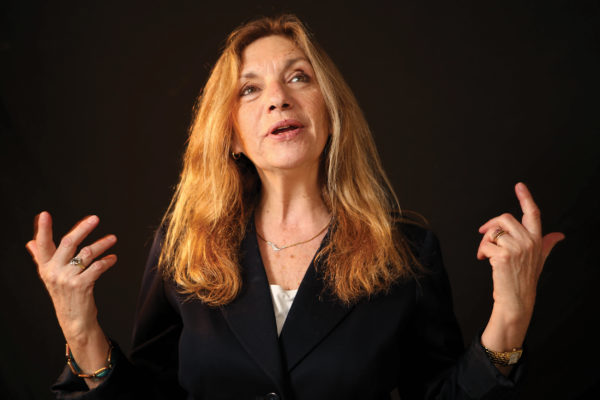When Antonella Del Fattore-Olson began teaching her first Italian-language class at The University of Texas at Austin in 1984, she was a new Austin resident looking for the sense of familial community that she felt in Italy, her home country. Although she had never considered teaching as a permanent career, Fattore-Olson says she quickly fell in love with being a professor and found a sense of connection with her students in the classroom.
Drawing on her newfound passion, Fattore-Olson says she saw an opportunity to revitalize the department by creating a sense of belonging and innovation for all on campus interested in the language. She wanted to provide a more immersive, hands-on learning experience for students and create relationships among everyone in the department.
“I was young and strong and really wanted to make a difference,” Fattore-Olson says. “I wanted the entire department to be strong and also to be more connected because everyone was doing their own thing.”
Today, Fattore-Olson is a distinguished senior lecturer and the director and founder of the Rome Study Program. She also leads the Italian Drama Workshop, a theater production put on every other year with advanced students of Italian.
Fattore-Olson’s original love is storytelling; she received a degree in comparative literature and theater with a specialization in modern American literature from the University of Rome La Sapienza. That background, she says, helps her provide multiple outlets for students to better learn the language through theater, literature, storytelling, history and culture.
The idea for the Rome Study Program came to Fattore-Olson, she says, after she found that students’ speaking abilities did not improve when they went on study abroad trips to Italy that focused on its history or culture instead of the language. She wanted to create a program that encouraged students to improve their speaking and comprehension skills while integrating them into the culture of Rome and Italy.
She presented her idea to many colleagues, who were supportive, but she says her students were the ones who actually made it come to life after they wrote to the dean expressing how much they wanted to go on her study abroad trip. That created “the magic group of ’96,” as Fattore-Olson refers to them. Thirty-six students went on the first Rome Study Program in 1996.
During the program, students take one language and one history class, and a conference course for majors in Italian, and stay with Italian families so they can consistently practice and rely on their speaking. Rather than only read from a textbook or listen to her lecture, students visit historical landmarks with Fattore-Olson, and she asks them to explain why that place is especially significant or interesting to them. Italian directors and writers also visit the students so they can better understand Italy today.
Since that first trip, Fattore-Olson has taken a new group of students to Rome every summer. But this year, all summer study abroad trips were canceled because of the COVID-19 pandemic.
“For the last 23 years I had the privilege to direct the Rome Study Program, teach and show my students the beauty and richness of my city and its secrets,” Fattore-Olson says. “It was extremely painful but unfortunately necessary, and we had to accept its cancellation.”
Italy began a nationwide lockdown March 10 and is one of the most drastically affected countries by the pandemic. The Italians’ hopeful and united response, signified through the trend #iorestoacasa, or “I stay at home,” is what Fattore-Olson describes as “typical Italian.” Fattore-Olson says she is proud of the musicians who created online events and that giant Italian names such as Armani, a luxury fashion house, and Beretta, a large firearm producer, converted their production facilities to make products for health care workers and hospitals to use.
“It’s devastating,” Fattore-Olson says. “I think the response of the Italian citizens was remarkable once the spreading became a serious threat. Artists sharing their music with everyone on social media, people singing from the balconies and windows, funny and dramatic videos created. Only in Italy!”
Fattore-Olson says she plans to take students to Rome again next year and is teaching one of the program’s courses online this summer to help upper-division Italian-language students stay on track.
When they return from Rome, many students take the Italian Drama Workshop. Fattore-Olson says she created this course to give students a creative expression while challenging them to become actors and work as a team, all in Italian. Each Italian Drama Workshop is a re-creation of a play by a famous Italian playwright.
“In that class, I’ll tell them on the very first day, this is a community. You have to respect each other. You have to help each other,” Fattore-Olson says. “It’s teamwork. Otherwise, we are not going to have a play.”
Fattore-Olson also collaborated with filmmakers Sergio Carvajal-Leoni and Romina Fattore-Olson to create ITAL, a Texas Italian storytelling project that ran from 2013 to 2019. For their final project, students found Italians in the Austin community to profile and made short documentaries to highlight Italian culture in a more familiar place.
“They weren’t just collaborating among themselves. They were collaborating with the Italian community outside of UT,” Fattore-Olson says. “So they will go out of their comfort zone, and they will really have to practice the language and learn from people who are not your professor that you feel very close to. That to me was the highest point of collaboration, when the students were not just collaborating amongst themselves and with the teacher and with the outside community of Italians, but they were really creating a product that is real.”
In that class, I’ll tell them on the very first day, this is a community. You have to respect each other. You have to help each other.



